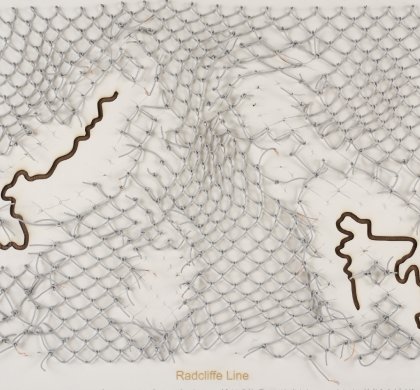
Note 33
This issue of Out of Print pays tribute to two singular literary figures of the subcontinent, the Urdu writer, Mustansar Hussain Tarar who celebrated his eightieth birthday in Lahore at the beginning of March, and Krishna Sobti who wrote in Hindi and passed away on January 25 at the age of ninety-three in Delhi.
Sobti was an extraordinary writer who developed her own style, incorporating a varied vocabulary including Punjabi, Gujarati and Rajasthani into her text, and using often spare, poetic and experimental language to extend her expression. Her work examined the lives and desires of her women protagonists with boldness and depth, even as she refuted being labelled as a woman writer. We feature one of her ‘earliest and most celebrated short stories’, ‘Sikka Badal Gaya’, translated by Daisy Rockwell. In a short note following the story, we reference Rockwell’s obituary of Sobti that elaborates on how the publication of the piece played a key role in launching Sobti as a writer. Published in Out of Print under its English title, ‘The Currency has Changed’, the story is a complex and uncompromising look at the departure of an elderly widow of a zamindar from her home at the time of Partition and is said to draw from Sobti’s own grandmother’s experiences.
Tarar’s story, ‘Baba Bagloos’, translated by Raza Naeem follows the routine of an elderly prisoner incarcerated in a city prison and culminates in a public hanging. The description of the crowd’s eager, insatiable fascination with the spectacle is particularly brutal and grotesque. Based on Bhutto’s execution, it was one of the works that caused Tarar, a host of a popular show, to be banned from appearing on television during the Zia ul Haq era. Tarar’s trajectory as a writer has been detailed by Naeem in his ‘Translator’s Note’ that is published below the story. Tarar’s adventurous spirit that took him on unusual journeys, behind the Iron Curtain, across Europe by road and up remote mountains, resulted in travelogues that had an appeal across a broad spectrum of readers. His literary work explores critical political issues in Pakistan and the world.
Two love stories provide relief from the emotional intensity of the previously listed works. Parineeta Singh’s ‘The House on Fox Hill’ draws the reader in with its charming, hopeful yet ineffectual protagonist who brings to mind some of the young men in R K Narayan’s stories. His winsome young neighbour’s interest in his adventures as a detective as he investigates a haunted house, lead to the realisation of his love. Ewa Mazierska’s ‘Shopping And Longing In Goa’ is set in Panjim and is told from the point of view of a tourist shopping in the city. An outsider, she views each small overture from men with scepticism. As she wanders through the city, drinking tea and buying things she does not need, one particularly brusque shopkeeper changes the course of her journey.
‘Regret’ by Ananya Dasgupta is a sensitive and honest examination of a young woman’s foray into being a teacher’s aide to a couple of underprivileged children in Boston. A chance encounter, many years later, brings the narrator face to face with her inability to break through to one young boy and the many layers of regret embodied therein.
Noor Niamat Singh’s ‘The Semicircle of Life’, her first publication, is an extraordinary journey into the mind of a young woman as she identifies emotional and psychological rafts to help her maintain stability as she deals with an unstable mother, a concerned circle of loved ones and a pregnancy she feels distanced and detached from.
The art on the cover of Out of Print 33 is by Reena Saini Kallat.
